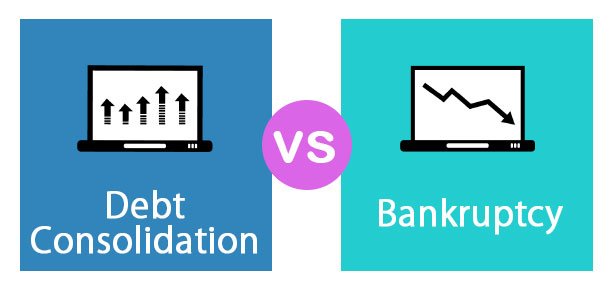Updated July 31, 2023
Difference Between Debt Consolidation vs Bankruptcy
The following article provides an outline for Debt Consolidation vs Bankruptcy. Winding up a company is a task in itself, and many legal obligations and paperwork go into the winding-up process. When a company files for bankruptcy or discontinues its operations, it has two options debt consolidation or bankruptcy. Debt consolidation vs bankruptcy are both sides of the same coin, making them look very similar. But when analyzed in depth, there are key differences to understand.

Head To Head Comparison Between Debt Consolidation vs Bankruptcy (Infographics)
Below is the top 8 difference between Debt Consolidation vs Bankruptcy

Key Differences Between Debt Consolidation vs Bankruptcy
Both Debt Consolidation vs Bankruptcy are popular choices in the market:
- Debt consolidation refers to the consolidation of debt by the company, which refers to surrendering all the company’s debt that the company finds difficult to repay. Debt consolidation refers to taking over all the company’s existing debt and finding a new borrower who can take the company’s loan at better payment terms. On the other hand, bankruptcy comes with procedures and legal proceedings wherein, under the bankruptcy code, the company can discharge some or all of its debts via Chapter 7 or also has the option of Chapter 13 bankruptcy.
- Under the concept of Debt consolidation, a new banker/lender is approached by the company wherein the company is looking to refinance the existing portfolio of loans and provide the existing loan with some months of a moratorium and interest rate reduction, which leads to ease of repayment of debt and also eases the debt servicing coverage ratio. On the other hand, under the concept of bankruptcy, you can dispose off your existing assets of the company at a fair value to repay some or all of the company’s debt; also, if the company has opted for Chapter 13 filling, it can establish a three to five-year plan to repay the debt of the company.
- Debt consolidation has two objectives: to simplify the repayment process for debtors while simultaneously reducing monthly payments and interest rates. On the other hand, bankruptcy follows a different process wherein a trustee is assigned to a particular case and is then responsible for paying off the company’s debt and other liabilities.
- Bankruptcy is more complicated than debt consolidation. Also, there are two major chapters in bankruptcy law Chapter 7 and Chapter 13. No matter which type of bankruptcy you file for, it’ll hurt your credit score for seven to ten years after filing.
Debt Consolidation vs Bankruptcy Comparison Table
Let’s look at the top 8 Comparisons between Debt Consolidation vs Bankruptcy.
| Debt Consolidation | Bankruptcy |
| Under Debt consolidation, the company needs to approach the investment Banker or the Financial Institution for re-financing of the loan. | Under bankruptcy, the company needs to approach a lawyer or a court of law to file for bankruptcy. |
| Debt consolidation protects the credit rating of the company. | When a company files for bankruptcy, it loses its credibility and reputation in the market. |
| Under debt consolidation, the company takes ownership of its assets. | Under bankruptcy, all the assets and liabilities of the company are transferred to the trustee, and the company losses ownership. |
| Debt consolidation can ease the interest and the repayment options, and in some cases, a balloon payment of a debt can also be made. | In bankruptcy, there is no such thing as ease of interest and repayment revision. |
| Debt consolidation keeps the credit score of the company or the individual intact and provides. | Bankruptcy also spoils the credit score of the company, which is the most important thing and the parameter to avail debt. |
| In debt consolidation, the company has a tax disadvantage as the IRS may treat the amount discounted on assets as Income. | There is no such provision of the policy of Income-tax in Bankruptcy. |
| In Debt Consolidation, there is no guarantee that the company will be able to achieve a fresh loan settlement. | Bankruptcy provides much surety when compared with Debt Consolidation. |
| In consolidation, debt is not forgone or even reduced. | Bankruptcy provides the option of debt reduction. |
Conclusion
Making the right choice between two Debt consolidation vs bankruptcy needs many legal obligations, and one must choose wisely, as it can impact the company’s operations in the long run. Therefore, choosing either of them comes with its pros and cons and its own rewards and consequences. But choosing between debt consolidation and bankruptcy may seem easy if you’re going to restructure your debt. Bankruptcy also allows you to avoid repaying the debt in full, which seems smart.
Recommended Articles
This has been a guide to the top difference between Debt Consolidation vs Bankruptcy. Here we also discuss the Debt Consolidation vs Bankruptcy key differences with infographics and comparison tables. You may also have a look at the following articles to learn more –


